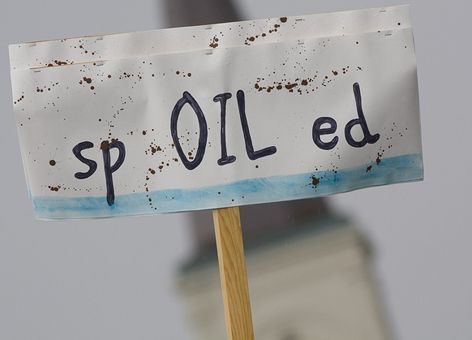Waking up to our Relationship with Oil
This is a post by Vicki Loe, Communications Coordinator for the Office of Response and Restoration. JULY 17, 2012 -- When I think about oil consumption, I immediately think of gasoline and how much I drive. And I often feel pretty good about it because I drive a relatively fuel-efficient car. But oil is part of plenty of other products in our lives too. Seattle, the city in which I live, recently has banned plastic bags, which are made from oil, and also prohibits restaurants and grocery stores from using Styrofoam (oil-based) containers for take-out food. A lot of people would agree that society's heavy dependence on oil has some negative consequences, which means we are happy about improving fuel efficiency and avoiding Styrofoam cups. But when I look over a list of everyday items made from oil, I am struck by how many of them we might use just in the first hour of a typical day.
For starters, the pillow I sleep on likely contains oil products. I wake up every day to the sound of my iPhone alarm at 6:30 a.m., and the phone's parts and the plastic encasing wouldn't exist without oil. It's a similar story for my shower curtain, shampoo, and bath soap. My toothbrush, toothpaste, and the container that holds my floss are made of oil. Same goes for my deodorant and moisturizer. My hair dryer and brush are plastic, so we can add them to the list. Lots of cosmetics contain oil, so if I wear lipstick or nail polish, there’s another one. If the clothes I put on contain synthetic fibers or my shoes have rubber soles, they too contain oil. So I grab my sunglasses (made of plastic) and head for my car, which has plastic parts, enamel, and tires that all were derived from oil, and—we can't forget—the gasoline that still powers it, however efficiently. By now, it’s 7:30 a.m., and I have used at least 20 products that are manufactured with oil, and I haven’t even made it to the coffee shop yet, where, thankfully, my coffee will come in a paper cup (but with a plastic lid).
Because oil plays such a huge role in most of our lives in the U.S., companies are drilling and transporting a lot of it in marine waters. That means that when accidents happen, oil can—and does—get spilled into the marine environment.
Scientists at the Office of Response and Restoration prepare for and respond to these oil spills: forecasting the movement and behaviors of spilled oil and chemicals, evaluating the risk to natural resources, and recommending the best cleanup measures. That means that we need to understand oil in order to deal with it properly.
Our society's relationship with oil is complex. For something that is so pervasive in our lives, many of us actually do not know much about it. In a special series on this website over the next several months, we will delve into a variety of topics, including what oil actually is, what makes it so useful, and why it can be so toxic in the marine environment.

 An official website of the United States government.
An official website of the United States government. 

